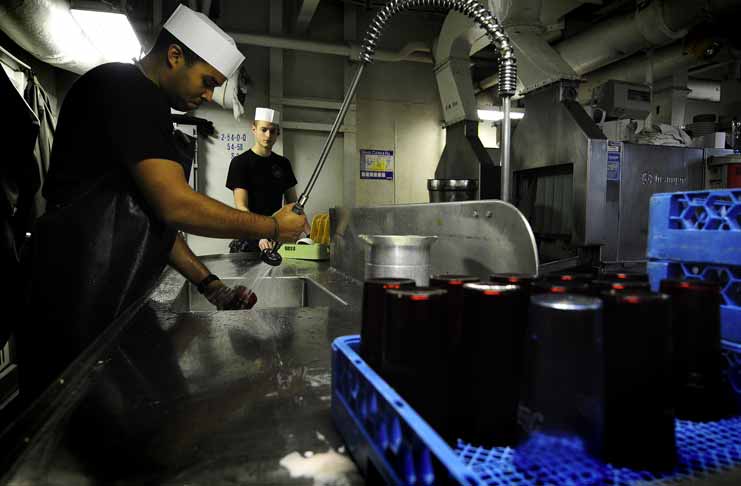For some of us, we don’t usually pay attention to our dishwasher when we clean our kitchen. Dishwashers are made to clean our dishes without manual scrubbing and dry them afterward, which gives the impression you don’t have to clean it after each use.
But, dishwashers also need to be maintained because it can get damaged from mineral build-up, foul odors, and soap build-up. There are several products in the market that advertise that they can clean your dishwashers efficiently. Unfortunately, these cleaners may have chemical components that may damage your dishwashers the longer you use them.
Here are four chemical-free ways to help you clean your smelly dishwasher and not spend too much:
1. Use Baking Soda
If you want to get rid of any smell in your dishwasher or any appliance, you can never go wrong with Baking soda.
To use baking soda in your dishwasher, you can dilute it with water and ensure it has a pasty consistency. Wipe the formula inside your dishwasher and let it sit there for an hour. After an hour, you can clean the paste off with a damp cloth that is soaked in vinegar or water. Don’t worry about leaving some baking soda paste in the dishwasher because after you wipe a majority of it with a cloth, you can set the dishwasher to clean for one short cycle. The cycle will clean the remaining pastes.
If you don’t want the baking soda to dry up inside your dishwasher, don’t select the “hot water” or “sanitize “option to clean. If you spot any more residue after the short cycle, put in a cup of vinegar on the dishwasher rack and let it run again.
After cleaning the dishwasher, you can regulate the smells by adding a bit of baking soda in the bottom of the dishwasher in between use. You can also leave the dishwasher door open slightly to allow air to circulate inside it. Any remaining baking soda you leave on the dishwasher can help the detergent you use to clean dishes faster, especially if you use hard water to clean dishes.
2. Clean with Lemon or Citric Acid
Another great way to clean your smelly dishwasher and give it a citrusy scent is by using lemon or citric acid from other citrus fruits. Citric acid is available in powder form in many supermarkets or grocery stores.
Citric acid can speed up mineral build-up and help get rid of grease and soap scums easily. It can also be a natural bleach for plates that have tomato or spice stains.
If you see that your dishwasher has an odd greasy coating or discoloration or have clogged sprayers, you can use citric acid to get rid of it. If there is a smelly odor inside it, you can add 3 to 4 tablespoons of citric acid on the dishwasher’s floor and run it in the “hot water” cycle then hit pause before it drains water. Let the water sit inside the dishwasher for a few hours before you continue the cycle. You can also put some citric acid to the detergent box and run one short cycle to clean your dishwasher.
If you will be using citric acid, do not breathe it in because it can cause lung and eye irritation. If it comes in contact with your eyes, wash it with water. You must also clean your skin with both soap and water if it makes contact with your skin. If irritation continues, contact your doctor.
You must also not use citric acid with detergent with chlorine bleach or chlorine bleach alone. When they combine, it will produce a corrosive gas that can be deadly if inhaled.
3. Use Vinegar
You can also clean your dishwasher with vinegar, which can disinfect and break down any mineral build-up caused by your detergent.
To use vinegar in your dishwasher, you can put two cups of vinegar on the dishwasher rack and leave it there. You can add drops of your favorite essential oils which can enhance the antibacterial properties of vinegar and leave a clean scent. Have the dishwasher start on a hot cycle and regularly do it every week and month.
Much like citric acid, do not add vinegar with any product that has chlorine bleach. It can produce a dangerous gas that is dangerous if inhaled.
If you require more professional assistance in cleaning your dishwasher, you can always ask a pro. In Australia for example, they even have commercial dishwasher specialists that can fix almost any dishwasher brand on the planet. Here’s one example of such a dishwasher specialist at https://warewashingsolutions.com.au/.
4. Clean key areas with water
Finally, you can also use plain water and sponge to clean your dishwasher and keep it smelling great. Check the drain filter and the spray arm because these areas are where the smelly scents often come from.
If you see clogs in your drain filter, you can remove it and wash it with soap and hot water. If it is the spray arm that is clogged, you can run it through the water to clean each hole.
Even if they clean your dishes and cutlery, dishwashers also need to be cleaned after each use. With these four steps, you can extend the lifetime of your dishwasher and keep it smelling fresh.
Want to learn some more tricks to make your kitchen better? Read this post of ours.
